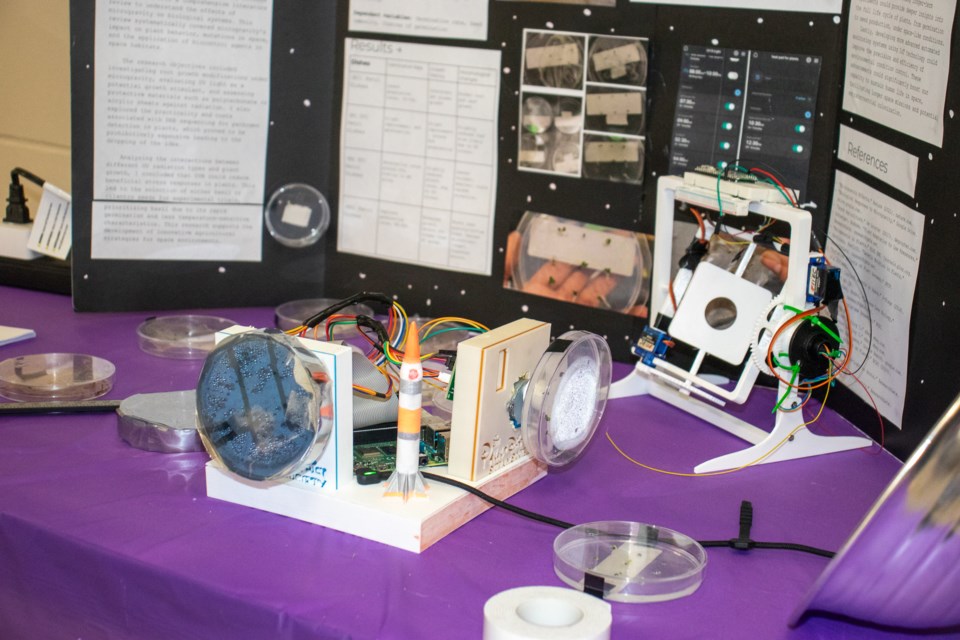LAKELAND – On April 13, the first ever independent regional science fair was held at the Portage College campus in St. Paul.
Hosted by the St. Paul & District STEAM Society (SPDSS), around 30 projects were on display. Students from Conseil scolaire Centre-Est, St. Paul Education, and Northern Light Public Schools participated, in addition to a project from Wisdom Homeschooling. Winners from selected categories will fly to Ottawa for the Canada-Wide Science Fair (CWSF), hosted by Youth Science Canada from May 26 to 31.
Germinating seed in space
Grade 9 Glen Avon School student Abeera Abbasi will be one of the local students heading to Ottawa for the national science fair. Her “AstroFlora: Engineering Plant Growth for Space Exploration” project worked on germinating basil seeds in a space condition. The project won top spot in her category.
The project, she says, is part of her research on space colonies, particularly on Mars. Through electrolysis, she split water molecules into hydrogen and oxygen. The idea is to use oxygen for humans, and hydrogen to boost plant growth – which is what her AstroFlora project was about.
To mimic space condition, Abbasi simulated micro-gravity inside petri-dishes where she planted seeds. She then used a UVB radiation lamp to simulate the effect of space radiation on seed germination. She wanted to use UVC radiation, but it was deemed too dangerous.
She found, through her experimentation, that seed germination in micro-gravity did better than in Earth conditions, “Which is really surprising,” she says.
Abbasi says her project stems from her curiosity about space. “There’s just so much we don’t know.”
Augmented Reality
Abdul Qudoos Abdulsalam worked on using augmented reality for those with impaired hearing. He created an app using Unity and Xcode that displayed what a user would be hearing in an environment.
“I have always been interested in augmented reality, and I thought it would be a good way to solve a problem that people might be facing,” says Abdulsalam.
Vaping in Youth
Ryan Noel worked on the “Vaping in Youth” Project. He wanted to raise awareness on vaping and its harmful effects, after noticing an increase in students vaping – some as young as 12-years-old.
There are risks, he says, “I just didn’t know if other kids [knew]... and I’m really hoping to bring awareness towards vaping and its harmful effects.”
He created a presentation about the risks of vaping, and a survey asking if respondents found the information useful and if it encouraged them to quit. Noel received 366 responses.
From those responses, Noel found that students do require more information about vaping, especially at a younger age. He hopes to create an initiative in the future to bring more awareness around the harmful effects of vaping.
Proud of youth
Chris Cameron, SPDSS’ director of youth, said he’s proud of what all the participating students accomplished with their projects. He says there are many young bright minds in the Lakeland.
“You could tell they really put in a lot of work. So, that was gratifying to see,” says Cameron. He also thanked all the partners who made the whole thing possible.
The science fair took a lot of work, says Cameron. Many teachers and mentors worked countless hours to guide the students as they worked on their project. Volunteers also helped with logistics in the background.
Khurram Abbasi, president of SPDSS, agreed. He says there were many people and organizations who stepped up to make the regional science fair a reality.
Winners
In the Elementary category, Kash Kopecky’s “How Does Pollution Affect Plants?” won first place; Luc Manseau and Elliot Bilodeau’s “Growing Crystals” won second; Alexandra Kerr and Natalay Nelson’s “Make your own shampoo” won third.
In the Junior (Grades 7 and 8) and Intermediate (Grades 9 and 10) categories, the top four winners
In the Junior category, Ryan Noel (Vaping in Youth) and Fatima Abbasi (Fire Fusion: the Future of Fire Detectors) won first and second places respectively and will be heading out to the CWSF. Dawood Mohammed (Making Mars Habitable) won third.
Abeera Abbasi (AstroFlora: Engineering Plant Growth for Space Exploration) and Kathryn Graham (Effects of Visual Stimuli on the Heart) won first and second place in the Intermediate category and will be heading out to the CWSF as well. Joshua Charbonneau and Hannah Poulin (TALOS - Tremendous AI Learning Operating System) won third.
Numerous awards have also been given out.
Awards
Crowd Favourite: “Earth - The Viable Planet” by Skylar Giesbrecht and Ash Winterbottom.
Future Einstein Award (Elementary): “Growing Crystals” by Luc Manseau and Elliot Bilodeau.
Eco Explorer Award (Elementary): "How Does Pollution Affect Plants?” by Kash Kopecky.
Best Overall Presentation: “Sloth Facts” by Alexis Boehk and Talia Kemaldean.
Sanofi Biogenius: “AstroFlora: Engineering Plant Growth for Space Exploration” by Abeera Abbasi.
Most Innovative Project: “Fire Fusion: the Future of Fire Detectors” by Fatima Abbasi.
Shad Canada Scholarship Winners: Abeera Abbasi, Zainab Shahzaman, Kathryn Graham, and Abdul Qudoos Abdulsalam.



